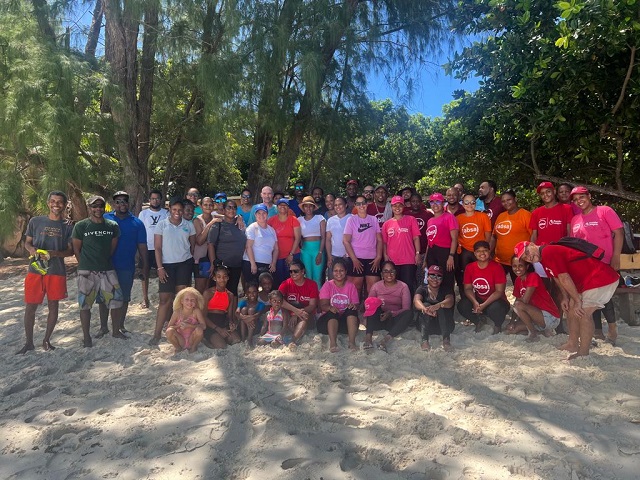The final phase of the Aldabra giant tortoise census on Curieuse Island, organised by the Seychelles Parks and Gardens Authority (SPGA), is expected to take place in two weeks with the aim of getting a better view of the species’ population on the island.
The census began in February with the help of local volunteers, the SPGA and staff of the Mauritius Commercial Bank (MCB), Absa Bank and Harry Savy Insurance (HIS).
“At SPGA, we do not have enough manpower to undertake this census on our own, so we had help from volunteers, who did a really good job,” said the head of the Terrestrial Research Unit, Nathalie Dusfrene.
As part of an effort to introduce the species to other islands, about 250 Aldabra giant tortoises were released on Curieuse in 1978 and they have spread across the island over the years.
Curieuse, a small granitic island of 2.9 square kilometres, is located near to the north coast of Praslin, Seychelles’ second most populated island.
The island is distinguished by its bare red soil mixed with the distinctive coco de mer palms, one of the Seychelles’ cultural icons and an endemic species, which are only found on the two adjacent islands.
The census was previously done on a yearly basis by Global Vision International (GVI), and the last time it was done was in 2019 due to the impact of the COVID-19 pandemic.
The census is being done with the help of volunteers. (Seychelles Parks and Gardens Authority) Photo License: CC-BY
Dufresne explained that the census needed to be completed so that it can help the SPGA to comprehend the island’s tortoise population growth, their movement, and distribution.
“In the last census, there was a total of 134 tortoises recorded on the island, and so far in this current census, we have recorded 110, which is why we want to have a third phase, to ensure we manage to count all of them,” added Dufresne.
With this census, tortoises are being measured and weight, while a gender-check is also being done, with most of the tortoises recorded were found to be male.
According to Dufresne, a larger male population will mean that more females will need to be sent to the island.
She added that to ensure tortoises are not being counted more than once, they are being marked with paint, so that they can easily be identified.
One of the world’s biggest tortoises, the Aldabra giant tortoise is endemic to Seychelles and native to the Aldabra Atoll.
Aldabra tortoises can reach the weight of up to 250 kilogrammes and age of up to 150 years old.

